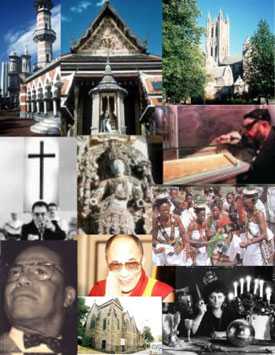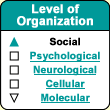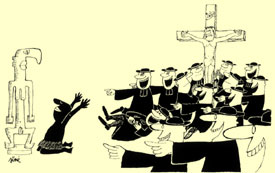|
|


Cult-like schisms can also develop within
major religions. Integrism is a schismatic
form of traditionalism, whose adherents seek to preserve the
original integrity of the doctrine in which they believe.
But integrists go one step further. For them, the scriptures
of their religion are universal truths that are indispensable
for the salvation of the world. Hence, anyone who questions
these truths, however slightly, is seen as a barbarous monster
who must be fought, or even eradicated by any means necessary.
Thus integrism goes beyond religion to become a fanatical
ideology, and no religion has been exempt from it—examples
include the Catholic
Inquisition, the Islam of the Taliban, Protestant
and Jewish integrism, and the creationism now embraced by so many fundamentalists in the United States.
|
|
|
| RELIGIONS: HELPFUL TRANQUILIZERS, OR OPIATE OF THE PEOPLE? |
|
One of the first discoveries that Homo
sapiens made was
the fact of death. In response to the anxiety that death elicited
in the earliest humans, they began to bury their dead and to seek
ways of restoring the social ties that were disturbed by the departure
of their loved ones.
 |
|
Death is regarded as the driving force not only behind culture,
but also behind the entire phenomenon of religion, with
its rituals, singing, and dancing, which has been used
to promote the cohesion of communities throughout known
history.
Except that, as Montaigne observed, wherever there are humans,
there is human folly. In other words, early on, the human
predispositions to cheat one another and to form power
hierarchies led some people to enhance their material
wealth, prestige, and access to resources by exploiting other
people's credulity and anxiety.
|
Thus, throughout history, cults have emerged whose stated goals
were spiritual but whose leaders have exercised absolute power
over their members. Typically, these members have been recruited
through an attractive approach that exploits legitimate aspirations
such as personal development, human fellowship, and spiritual enlightenment.
But very quickly, individuals who join such
cults find themselves in conflict with society and
become isolated from their friends, neighbours, and family. Thus
cut off from their anchors in the broader community, cult members
become psychologically vulnerable and lose their capacity for critical
thinking. It then becomes just as hard for them to leave the cult
as it was easy for them to join it.
|
|






